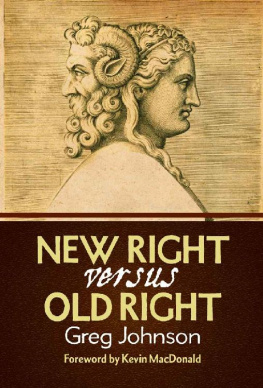Greg Johnson - In defense of prejudice and other essays
Here you can read online Greg Johnson - In defense of prejudice and other essays full text of the book (entire story) in english for free. Download pdf and epub, get meaning, cover and reviews about this ebook. year: 2017, genre: Politics. Description of the work, (preface) as well as reviews are available. Best literature library LitArk.com created for fans of good reading and offers a wide selection of genres:
Romance novel
Science fiction
Adventure
Detective
Science
History
Home and family
Prose
Art
Politics
Computer
Non-fiction
Religion
Business
Children
Humor
Choose a favorite category and find really read worthwhile books. Enjoy immersion in the world of imagination, feel the emotions of the characters or learn something new for yourself, make an fascinating discovery.

- Book:In defense of prejudice and other essays
- Author:
- Genre:
- Year:2017
- Rating:5 / 5
- Favourites:Add to favourites
- Your mark:
- 100
- 1
- 2
- 3
- 4
- 5
In defense of prejudice and other essays: summary, description and annotation
We offer to read an annotation, description, summary or preface (depends on what the author of the book "In defense of prejudice and other essays" wrote himself). If you haven't found the necessary information about the book — write in the comments, we will try to find it.
In defense of prejudice and other essays — read online for free the complete book (whole text) full work
Below is the text of the book, divided by pages. System saving the place of the last page read, allows you to conveniently read the book "In defense of prejudice and other essays" online for free, without having to search again every time where you left off. Put a bookmark, and you can go to the page where you finished reading at any time.
Font size:
Interval:
Bookmark:
I N D EFENSE OF P REJUDICE
& O THER E SSAYS
by
G REG J OHNSON
Counter-Currents Publishing Ltd.
San Francisco
2017
Copyright 2017 by Greg Johnson
All rights reserved
Cover image :
Georges de La Tour, The Fortune Teller , circa 1630
The Metropolitan Museum of Art
Cover design by
Kevin I. Slaughter
Published in the United States by
C OUNTER- C URRENTS P UBLISHING L TD.
P.O. Box 22638
San Francisco, CA 94122
USA
http://www.counter-currents.com/
ISBNs
Hardcover Edition: 978-1-940933-59-7
Paperback Edition: 978-1-940933-60-3
Electronic Edition: 978-1-940933-61-0
C ONTENTS
P ART I
White Nationalism
The Trump Phenomenon
Sexual Politics
P ART II
Cosmopolitanism
The Legacy of the Old Right
The Jewish Question
In Memoriam
F OREWORD
Change, yes, is necessary, and painful, too. Most painful and most necessary are those large-scale psychological reorientations mandated by information and candor. Unhappily our country has been burdened from the beginning by what is perhaps the most destructive and anti-experiential dogma ever to find purchase in the minds of innocents and mountebanks, specifically the belief, or faith rather, in the universal equality of human beings. On this accounting, the difference between good and bad people disappears. Our classical and medieval phases were never as nave as this.
Nothing is equal, not restaurants nor racehorses nor most especially the memberships of attested species. It is to be doubted if even garden-variety quarks are fully equal, if quantum physics may be trusted. As to those who actually do believe in human equality, it is difficult to understand how they choose their mates when a simple lottery would be easier. (Some do so choose, it sometimes appears.)
Very soon we will have to put equality behind us if our civilization, the one that has given more to life on this planet than all other civilizations added up together, is to persist. Is quality more precious than quantity, or will post-modern anomie run its course unhindered? It is therefore those who, like Greg Johnson, are already assembling the intellectual foundations of a new dispensation who must be seen as our most valuable and essential persons, men of mind and spirit capable of capsizing a doctrine that delights the worst and marginalizes the best, our present system in other words.
Tito Perdue
Brent, Alabama
February 19, 2017
P REFACE
This volume collects 45 articles, lectures, and reviews35 of which date from the spring of 2015 to the beginning of 2017 and thus offer the freshest statements of my evolving ideas as I comment on the Donald Trump phenomenon and the explosion of interest in the Alternative Right. I have supplemented these with 10 older pieces which deserve a new audience. The volume naturally falls into two parts. Part I is devoted to the shorter and more topical pieces. Part II contains the more perennial ones, most of them longer and more densely argued. With two exceptions, all of these pieces were first published on the Counter-Currents/ North American New Right webzine. The original place and date of publication are indicated at the end of each piece.
I wish to thank John Morgan, Michael Polignano, and James OMeara for their help preparing this book for the press, and Kevin Slaughter for his excellent design work. I also wish to thank Tito Perdue for his splendid Foreword; Tom Goodrich, Jez Turner, Charles Krafft, Buttercup Dew, Kerry Bolton, Margot Metroland, Leo Yankevich, and Lawrence Murray for their promotional blurbs; and Kevin MacDonald of The Occidental Observer and The Occidental Quarterly , where two of these pieces originally appeared. Thanks are also due Jez Turner and The London Forum crew; Frodi Midjord, Daniel Hglund, and the Logik Frlag team; and Daniel Friberg and the Arktos team for setting up the original presentations of the lectures included here. Finally, I wish to thank the readers, writers, commenters, and donors who make Counter-Currents possible.
This book is dedicated to Tito Perdue. Read his novels The Node , Reuben , and The Bent Pyramid if you want to learn how to turn the world around.
New York City
January 27, 2017
I N D EFENSE OF P REJUDICE
Years ago, a friend told me a parable about a species of hominid that did not live to inherit the earth. These hominids regarded each and every entity as entirely unique. When a tiger leaped out of the darkness and dragged one of them to his doom, this did not prompt any generalizations about tigers as a group. Thus when a new tiger began to prowl the shadows at the verge of the firelight, he was not judged on the basis of the other tigers behavior. Indeed, if the first tiger came back, they would not have judged him on the basis of his past behavior either, because that was then, and this is now: two unique, individual moments in time.
But even though tigers are not always man-eaters, and man-eaters are not always hungry, these poor creatures still went extinct, because their problems were not limited to tigers. They could not learn from any experiences at all. They were just too dumb to survive.
Survival, you see, requires the ability to learn from past experiences so that one can predict and even control future ones. To do this, however, one must recognize that there are not just individual beings, but kinds or types of beings. Individuals belong to the same kind if they share a common nature. And, since what we can do follows from our nature, we can infer that if a tiger is dangerous once, it will probably be dangerous again. And if one tiger is dangerous, it is probable that other tigers are dangerous too. Thus if one of us is killed by a tiger, we can take reasonable precautions to make sure that it does not happen again.
Drawing conclusions about kinds based on individuals is called inductive generalization . Induction allows you to infer that all members of a kind are like that based on ones experience of individual members. These purple berries made me sick today, so they will probably make me sick tomorrow, since their nature and mine will probably not change overnight. And since you have the same nature as me, they might make you sick too. And since the purple berries on this bush are the same as the ones on the first bush, theyll probably make us sick too. The flesh of this animal tastes good to me, so it will probably taste good to you too, since we have the same nature. And other members of its kind will probably taste good to us as well, since they have the same nature too.
However, induction also teaches that natural traits tend to graph along bell curves, with a large number of typical cases in the middle, and small numbers of atypical cases on each end. Typical purple berries will make us sick, but on every bush, there might be some that have no negative effect and others that are downright toxic. Thus, inductive generalizations hold not always, but for the most part. In terms of any given trait, Not all X are like that. But most of them are.
Inductive reasoning is, therefore, probabilistic . There is always the possibility that one is not dealing with a typical instance of a kind. But it is not likely, since the atypical is by definition rare. Furthermore, as we experience more particulars, it becomes less likely that we are dealing with outliers, and our generalizations about a type become increasingly fixed. We even come to have a sense of what outliers are typical.
Although this is not common parlance, one could refer to a well-established inductive generalization as a stereotype, which comes from the Greek stereos (), fixed or firm, and the Greek typos (), or type.
Inductive generalization does not just allow us to learn from past experience, which would be of merely theoretical interest. Induction also has important practical implications, for it allows us to predict future experiences based on past ones, thus allowing us to act advantageously, even intervene in the course of events and control natural phenomena.
Next pageFont size:
Interval:
Bookmark:
Similar books «In defense of prejudice and other essays»
Look at similar books to In defense of prejudice and other essays. We have selected literature similar in name and meaning in the hope of providing readers with more options to find new, interesting, not yet read works.
Discussion, reviews of the book In defense of prejudice and other essays and just readers' own opinions. Leave your comments, write what you think about the work, its meaning or the main characters. Specify what exactly you liked and what you didn't like, and why you think so.










